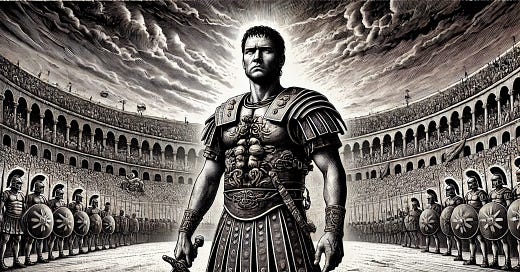“What we do in life echoes in eternity.”
These words, spoken by Maximus Decimus Meridius in Gladiator (2000), are more than cinematic bravado. They are a haunting echo of the Gospel—where eternity hangs in the balance, where the arena is not merely a place of spectacle, but of judgment, sacrifice, and glory.
At first glance, Ridley Scott’s Gladiator is a film about vengeance and Roman honor. But under its blood-stained surface lies a narrative shaped by eternal truths. It is not a Christian film by name—but it is saturated with Christian meaning by design, echoing the stories of martyrs, the message of the cross, and the hope of a kingdom not made by hands.
Let us draw out three Gospel themes that run through Gladiator like veins of gold through granite: Righteous Suffering, True Kingship, and The Homeland Beyond Death.
I. Righteous Suffering: The Just Man Condemned
Maximus suffers not because he is guilty, but because he is faithful.
He is loyal to the true emperor, devoted to his family, and unwilling to serve a tyrant. And for this, he is cast down—stripped of rank, betrayed, enslaved, and forced to fight like an animal for the amusement of Rome’s crowds.
This is not merely a plot device. It is a biblical archetype.
Isaiah speaks of the “man of sorrows… despised and rejected” (Isaiah 53:3). Plato once wrote that if the truly just man appeared, he would be crucified. Christ was. So too, in his own shadowed way, is Maximus—beaten, broken, paraded before the mob, yet never bowing to evil.
He enters the arena not as a spectacle of violence, but as an image of the righteous sufferer, unjustly condemned and yet filled with resolve. He reflects Job in armor, Joseph with a sword, and Christ on the road to Golgotha.
The message is clear: in a fallen world, justice is costly.
II. False Kings and True Lords
Commodus, played with chilling brilliance by Joaquin Phoenix, is the image of false power. He is the anti-king: seductive in speech, weak in soul, adored by the crowd yet hollow inside. He rules through spectacle and manipulation—offering bread and circuses while Rome rots beneath him.
He is the Roman embodiment of the Antichrist: a ruler without virtue, promising peace but delivering chains.
Maximus, by contrast, is the servant-leader. He seeks no crown. He desires no throne. He simply wants to return home in peace. And for that very reason, he is worthy of the throne.
He reflects the pattern of the true King:
“Though He was in the form of God, He did not count equality with God a thing to be grasped, but emptied Himself…” (Philippians 2:6–7)
Commodus rules through force. Maximus, through sacrifice. Commodus seduces the people. Maximus earns their trust through valor. One builds an empire of smoke; the other plants seeds of a kingdom yet to rise.
III. The Homeland Beyond Death
The most powerful scenes in Gladiator are not its battles—but its silences.
Maximus walks through golden fields. He sees his wife and son waiting. He stretches out his hand toward them. This is no mere dream of peace. It is the ache for eternity.
“For here we have no lasting city, but we seek the city that is to come.” (Hebrews 13:14)
Every action Maximus takes is fueled not by hatred—but by longing. His heart is set on home, not revenge. And in this, he becomes a reflection of every Christian soul who looks past the dust and roar of the arena and longs for the heavenly country.
His death is not defeat. It is a passage. He dies, not to win Rome’s applause, but to set its soul free. He walks into glory, not with a sword in hand, but with peace in his eyes.
The Arena and the Cross: A Call to the Faithful
Gladiator is not a Christian film—but it is a Gospel-shaped story. It speaks in images rather than doctrine, but the shape is unmistakable.
A righteous man suffers unjustly.
A false king rules with deceit.
A people hunger for justice.
A sacrifice breaks the chains.
And beyond it all—a kingdom that cannot be shaken.
And here lies the final truth: we are no longer spectators.
The modern world has become the arena once more. Christians are mocked, truth is censored, and power is wielded by those who would rather entertain the masses than serve the good.
The Commoduses of our age wear different robes—but their empire is the same: built on lies, sustained by fear, and hostile to righteousness.
Yet like Maximus, we must endure. We must remember the King we serve. We must fix our eyes not on the crowds, nor on the tyrants, but on the gates of our true homeland.
“Be faithful unto death, and I will give you the crown of life.” (Revelation 2:10)
We Are in the Arena Now
Do not despair at the blood and dust. Do not lose heart when false kings rule. The true kingdom comes not by the sword, but through sacrifice. Not through manipulation, but through witness.
We are Maximus now.
We carry the scars of faithfulness.
We fight for a city we cannot yet see.
We die daily for a crown that does not perish.
And when the gates of eternity swing open, may we walk through—not as slaves, but as sons.
What we do in life echoes in eternity.
Let us live accordingly.




